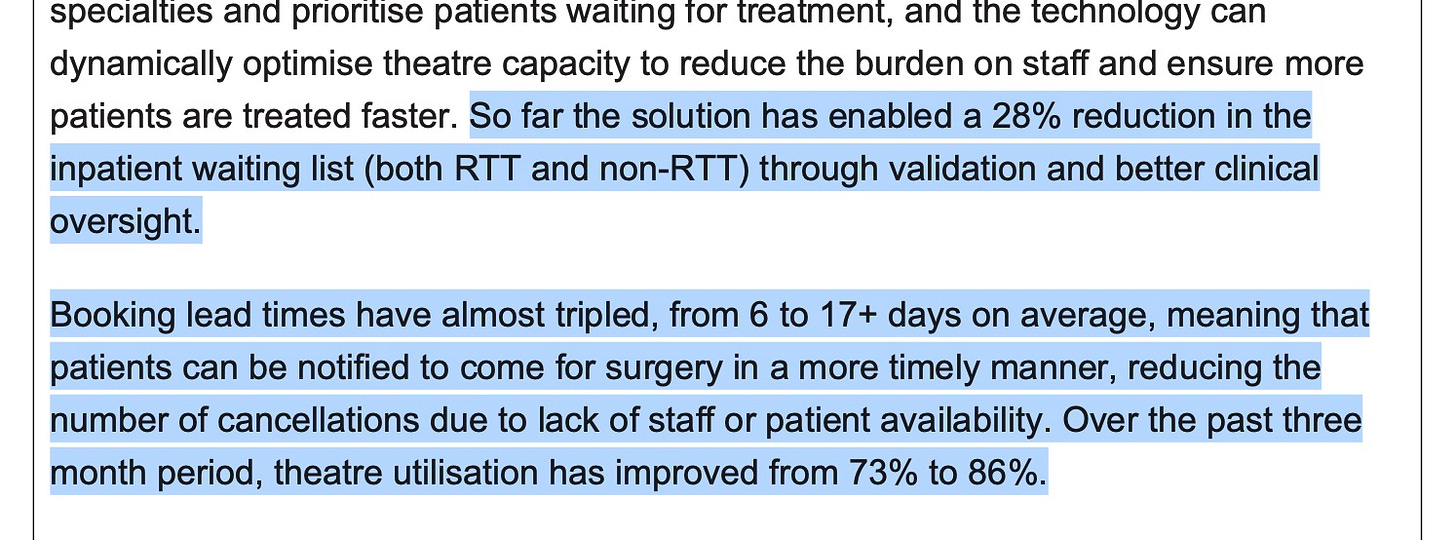Palantir is Taking Over the Healthcare Industry
And how Foundry is helping solve its biggest challenges
The fact that Palantir is working in virtually every industry isn’t a surprise to anyone. In some markets they not only have a presence, but completely dominate and are practically a monopoly in what they do.
Foundry is a brutally efficient machine designed to help clients achieve unprecedented results.
The topic isn’t new to this Substack. As many of you know, I’ve written about Palantir’s growing presence in the automotive industry and how Foundry is becoming the gold standard in the consulting world. Needless to say, SkyWise, Athinia and other platforms built on top of Foundry serve as examples to their own industries of my point here - that there’s a gap and Palantir is able to fill it.
We already know the NHS is considering awarding Palantir a £400M contract to develop a “Federated Data Platform”, and that they are already providing the British government health solutions and the Ministry of Defence has strong ties to Gotham.
"Foundry is one [system] that does a really good job. At Chelsea and Westminster, [this technology] led to almost 1/3 reduction in their backlog.”
United Kingdom’s PM, Rishi Sunak
The Prime Minister knows what he is talking about, and he also knows that Foundry has allowed doctors to have more time to communicate with patients and schedule visits, expanding the use of the same supply to more demand, ultimately saving lives.
But we already knew this, so what’s new?
A new Foundry entity has recently emerged: Health Consortium. And I can only guess it’s an upcoming event, similar to what FoundryCon is but with speakers from the healthcare world.
I would see this as a natural consequence of a growing presence of Palantir in this industry following recent announcements and partnerships - Cleveland Clinic & Tampa General Hospital - and the subsequent platforms planned to be built on top of Foundry. Just like what Cardinal Health and Palantir announced some days ago: a “Clinically Integrated Supply Chain Solution”.
Not only that, but healthcare companies rank #1 in DataBase, meaning it’s the single largest industry that is using Foundry. There are more healthcare entities than energy ones, for example.
And we are seeing more names every week, from pharmaceutical companies and basic medicine to hospitals and large institutions. It’s what Palantir’s CTO, Shyam Sankar, said the other day at FoundryCon23 and what the company has been arguing for some time, that the company is basically the “health tech startup you’ve never heard of”.
So it’s not only the fact that they managed the distribution of the Covid-19 vaccines in the US and in the UK, or the work they do with the NHS, on top of every company that enlists to use Foundry. But governments are also stepping up and adopting Foundry for health-related issues. Palantir not only prevents terrorists from attacking, but also diseases from outbreaking.
US and Western government agencies and health initiatives are using Foundry (mainly behind codenames) and they are at a point where it’s the backbone of their working infrastructure, they need Foundry to execute and, as I said at the beginning of this article, the end product are lives saved.
I think it’s pretty safe to assume we will see healthcare companies share same Foundry platforms to solve their needs, if they aren’t doing so already. First because it’s easy to set up, then because it’s effective while efficient, and they will want to keep it because the modularity of the software will make them able to solve different issues without completely changing their framework.
And the recently announced marketplace will grow and organically connect every player in the health business. Just like FoundryCon does, let clients be the sales people.
Health Consortium could also be a platform used by some company or an internal initiative, but if it’s an event organized by Palantir to showcase their solutions in the healthcare industry - and it’s probably this -, you’ve read it here first!







Either is on 🔥 great job! This NHS deal is the most suffered contract in history Ahah
🔥👍🏻